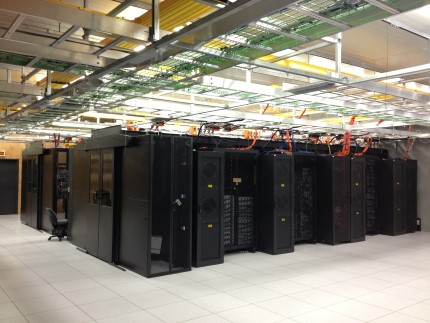New nanotechnology to clean up waterways

The supercomputer used by Dr Garden; the Pan cluster operated by NeSI at the University of Auckland
Posted: Thu, 3 Nov 2016
Nitrate pollution of New Zealand’s waterways has become a serious problem over the past few decades due to agricultural intensification and overuse of fertilisers. Nitrate promotes algae growth, leading to oxygen depletion and loss of biodiversity. It is also harmful to human health, reducing the ability of blood cells to transport oxygen around the body.
Nitrate can be removed from contaminated water by converting it to oxygen and nitrogen gas, which are harmless. However, this is impractical without smart catalytic conversion technologies to speed up the process and reduce the high energy requirement.
Dr Anna Garden from the University of Otago’s Chemistry Department has been awarded a Marsden-funded Fast-Start grant to help solve this problem. She will collaborate with Associate Professor Egill Skúlason from the University of Iceland to design new nanoparticle catalysts that can selectively convert nitrate to nitrogen without generating harmful by-products.
Nanoparticles have a high surface to volume ratio, diverse chemical environments and unique reactivity patterns – all good traits for their development into highly efficient catalysts. Unfortunately, the number of possible nanoparticles of different structure and/or composition is virtually limitless.
Dr Garden plans to use computational techniques to come up with an efficient screening process to eliminate nanoparticles that will not be catalytically active. The project’s ultimate goal is to identify optimum nanoparticle catalysts for quick and safe removal of nitrate from drinking water.

Dr Anna Garden, University of Otago
Total Funding: $300,000 (excl. GST) over 3 years
Researchers: Dr Anna Garden, Department of Chemistry, University of Otago, PO Box 56, Dunedin 9054
